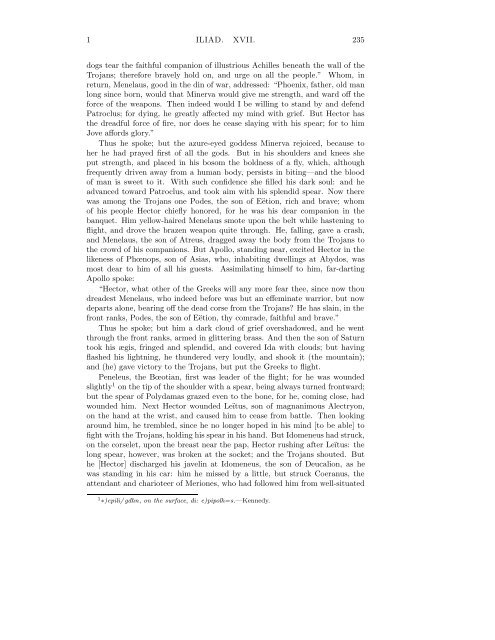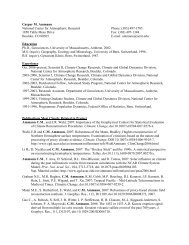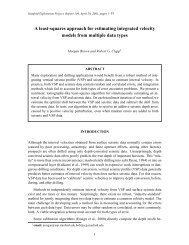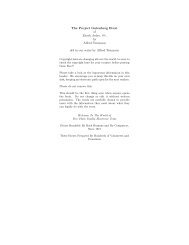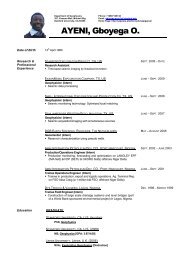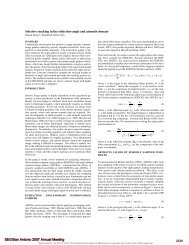The Project Gutenberg Etext of the Iliad of - Stanford Exploration ...
The Project Gutenberg Etext of the Iliad of - Stanford Exploration ...
The Project Gutenberg Etext of the Iliad of - Stanford Exploration ...
Create successful ePaper yourself
Turn your PDF publications into a flip-book with our unique Google optimized e-Paper software.
1 ILIAD. XVII. 235<br />
dogs tear <strong>the</strong> faithful companion <strong>of</strong> illustrious Achilles beneath <strong>the</strong> wall <strong>of</strong> <strong>the</strong><br />
Trojans; <strong>the</strong>refore bravely hold on, and urge on all <strong>the</strong> people.” Whom, in<br />
return, Menelaus, good in <strong>the</strong> din <strong>of</strong> war, addressed: “Phoenix, fa<strong>the</strong>r, old man<br />
long since born, would that Minerva would give me strength, and ward <strong>of</strong>f <strong>the</strong><br />
force <strong>of</strong> <strong>the</strong> weapons. <strong>The</strong>n indeed would I be willing to stand by and defend<br />
Patroclus; for dying, he greatly affected my mind with grief. But Hector has<br />
<strong>the</strong> dreadful force <strong>of</strong> fire, nor does he cease slaying with his spear; for to him<br />
Jove affords glory.”<br />
Thus he spoke; but <strong>the</strong> azure-eyed goddess Minerva rejoiced, because to<br />
her he had prayed first <strong>of</strong> all <strong>the</strong> gods. But in his shoulders and knees she<br />
put strength, and placed in his bosom <strong>the</strong> boldness <strong>of</strong> a fly, which, although<br />
frequently driven away from a human body, persists in biting—and <strong>the</strong> blood<br />
<strong>of</strong> man is sweet to it. With such confidence she filled his dark soul: and he<br />
advanced toward Patroclus, and took aim with his splendid spear. Now <strong>the</strong>re<br />
was among <strong>the</strong> Trojans one Podes, <strong>the</strong> son <strong>of</strong> Eëtion, rich and brave; whom<br />
<strong>of</strong> his people Hector chiefly honored, for he was his dear companion in <strong>the</strong><br />
banquet. Him yellow-haired Menelaus smote upon <strong>the</strong> belt while hastening to<br />
flight, and drove <strong>the</strong> brazen weapon quite through. He, falling, gave a crash,<br />
and Menelaus, <strong>the</strong> son <strong>of</strong> Atreus, dragged away <strong>the</strong> body from <strong>the</strong> Trojans to<br />
<strong>the</strong> crowd <strong>of</strong> his companions. But Apollo, standing near, excited Hector in <strong>the</strong><br />
likeness <strong>of</strong> Phœnops, son <strong>of</strong> Asias, who, inhabiting dwellings at Abydos, was<br />
most dear to him <strong>of</strong> all his guests. Assimilating himself to him, far-darting<br />
Apollo spoke:<br />
“Hector, what o<strong>the</strong>r <strong>of</strong> <strong>the</strong> Greeks will any more fear <strong>the</strong>e, since now thou<br />
dreadest Menelaus, who indeed before was but an effeminate warrior, but now<br />
departs alone, bearing <strong>of</strong>f <strong>the</strong> dead corse from <strong>the</strong> Trojans? He has slain, in <strong>the</strong><br />
front ranks, Podes, <strong>the</strong> son <strong>of</strong> Eëtion, thy comrade, faithful and brave.”<br />
Thus he spoke; but him a dark cloud <strong>of</strong> grief overshadowed, and he went<br />
through <strong>the</strong> front ranks, armed in glittering brass. And <strong>the</strong>n <strong>the</strong> son <strong>of</strong> Saturn<br />
took his ægis, fringed and splendid, and covered Ida with clouds; but having<br />
flashed his lightning, he thundered very loudly, and shook it (<strong>the</strong> mountain);<br />
and (he) gave victory to <strong>the</strong> Trojans, but put <strong>the</strong> Greeks to flight.<br />
Peneleus, <strong>the</strong> Bœotian, first was leader <strong>of</strong> <strong>the</strong> flight; for he was wounded<br />
slightly 1 on <strong>the</strong> tip <strong>of</strong> <strong>the</strong> shoulder with a spear, being always turned frontward;<br />
but <strong>the</strong> spear <strong>of</strong> Polydamas grazed even to <strong>the</strong> bone, for he, coming close, had<br />
wounded him. Next Hector wounded Leïtus, son <strong>of</strong> magnanimous Alectryon,<br />
on <strong>the</strong> hand at <strong>the</strong> wrist, and caused him to cease from battle. <strong>The</strong>n looking<br />
around him, he trembled, since he no longer hoped in his mind [to be able] to<br />
fight with <strong>the</strong> Trojans, holding his spear in his hand. But Idomeneus had struck,<br />
on <strong>the</strong> corselet, upon <strong>the</strong> breast near <strong>the</strong> pap, Hector rushing after Leïtus: <strong>the</strong><br />
long spear, however, was broken at <strong>the</strong> socket; and <strong>the</strong> Trojans shouted. But<br />
he [Hector] discharged his javelin at Idomeneus, <strong>the</strong> son <strong>of</strong> Deucalion, as he<br />
was standing in his car: him he missed by a little, but struck Coeranus, <strong>the</strong><br />
attendant and charioteer <strong>of</strong> Meriones, who had followed him from well-situated<br />
1 ∗)epili/ gdhn, on <strong>the</strong> surface, di: e)pipolh=s.—Kennedy.


